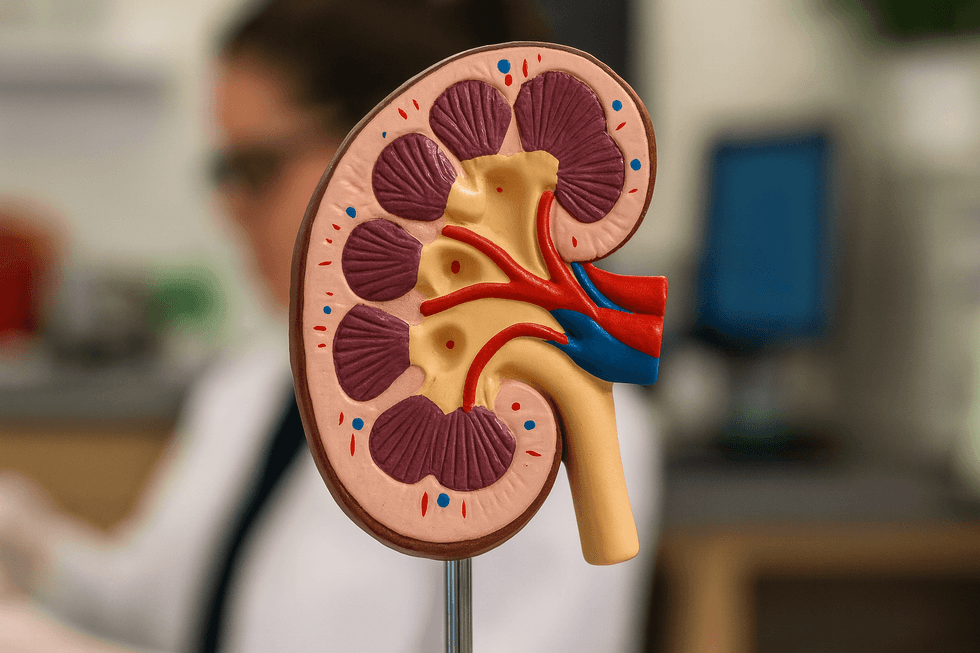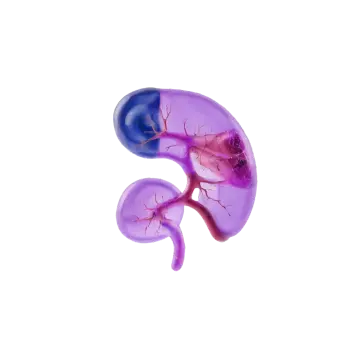Quick version
Kidney function tests show how well the kidneys clean the blood and regulate fluid balance. By measuring Creatinine, Cystatin C and eGFR, you can detect early signs of kidney failure – often before symptoms are noticeable. Regular check-ups are especially recommended if you have diabetes, high blood pressure or are elderly.
Kidney function tests show how effectively the kidneys clear the blood of waste products and regulate fluid balance. The most important markers – Creatinine, Cystatin C and eGFR – are used to detect early signs of impaired kidney function. Elevated values do not always mean disease, but should be followed up, especially in cases of diabetes, high blood pressure or long-term medication use. Regular monitoring is the best way to maintain healthy kidneys for life.
- Creatine: A breakdown product that is formed when muscles metabolize energy. Since creatinine is produced at approximately the same rate every day, it serves as an indirect indicator of the kidneys' filtration capacity. If the kidneys are unable to clear creatinine from the blood, the level rises. Elevated creatinine can therefore indicate impaired kidney function, but the value is also affected by age, gender, muscle mass, fluid level and diet. For example, a fit person with high muscle mass may have a slightly higher value without it meaning that the kidneys are diseased, while older people may have impaired kidney function despite creatinine within the normal range.
- Cystatin C: A small protein that is continuously produced in all cells of the body and passes freely through the kidney's filter. Because production is uniform and is not affected by muscle mass, gender or diet, cystatin C is considered a more stable and reliable marker than creatinine - especially in the elderly, children, people with low muscle mass or when early kidney damage is suspected. Elevated cystatin C can reveal an incipient deterioration of kidney function even when the creatinine value still looks normal. Therefore, it is often used as a complement to confirm or refine the interpretation of eGFR.
- eGFR (estimated glomerular filtration rate): A calculated measure that shows how much blood the kidneys filter per minute. It is calculated based on creatinine or cystatin C levels along with factors such as age, gender and body size. A normal eGFR is usually above 90 ml/min/1.73 m². When eGFR drops, it means that the kidneys' cleaning ability is decreasing. Values between 60 and 89 can still be normal in older people, while lower levels often indicate impaired function. eGFR is also used to monitor development over time and to determine whether the deterioration is temporary, stable or progressive.
Together, these values provide a comprehensive picture of the kidneys' ability to clean the blood. By combining creatinine, cystatin C and eGFR, even small changes in filtration capacity can be detected and how kidney function develops over time.
How are kidney tests interpreted in healthcare?
In healthcare, doctors interpret kidney tests by comparing creatinine, cystatin C and eGFR and seeing how they change over time. Since kidney function can vary temporarily due to dehydration or infection, for example, it is important that the values are assessed in context.
- eGFR above 90 ml/min: Normal kidney function.
- eGFR 60–89 ml/min: Mildly impaired function, often without symptoms. May be normal in old age.
- eGFR 30–59 ml/min: Moderate kidney function impairment. Should be followed up and investigated.
- eGFR 15–29 ml/min: Severe impairment – risk of symptoms and complications.
- eGFR below 15 ml/min: Severe kidney failure – dialysis or transplantation may be necessary.
The doctor also considers other factors such as blood pressure, urine tests and any symptoms. The combination of high creatinine, elevated cystatin C and low eGFR strengthens the suspicion of kidney damage. In some cases, the tests are repeated after a few days to confirm that the change is permanent.
Kidney failure – when the kidneys lose their filtration ability
When the kidneys lose their ability to filter the blood effectively, waste products and fluid begin to accumulate in the body. This leads to a gradual imbalance in the entire system – from blood pressure and salt balance to the body's acid-base level. The condition is called kidney failure and can be acute or chronic depending on how quickly the deterioration occurs and whether it can be recovered.
- Acute kidney failure: Develops suddenly, often within days. It can be caused by severe dehydration, severe infection, low blood pressure, blocked urine flow (such as kidney stones or prostate enlargement), or medications that temporarily affect the kidneys – especially certain painkillers (NSAIDs) or contrast agents for X-ray examinations. In acute kidney failure, creatinine and cystatin C levels rise rapidly, while eGFR drops markedly. If the cause is found in time and treated, the kidneys can often recover completely. However, if left untreated, the condition can quickly become life-threatening.
- Chronic kidney failure: Is a slowly progressive deterioration that occurs over months or years. The most common causes are diabetes and high blood pressure, but age, obesity, heredity, medications and chronic inflammation of the kidneys can also contribute. Many people do not notice anything until a large part of the function has already been lost. Fatigue, swelling in the legs, itching or foamy urine are late signs. Therefore, the condition is often discovered by chance – during a health check-up or other blood test. The important thing is to follow the development over time and understand the change, not just focus on individual values.
The difference between acute and chronic renal failure is mainly about the course and the possibility of recovery. Acute renal failure can completely reverse if treated quickly, while chronic renal failure rarely heals – but it can be slowed, stabilized and managed effectively with the right treatment, lifestyle changes and follow-up. The earlier the impairment is detected, the greater the chance of preserving kidney function in the long term.
Research shows that chronic renal failure is often a “silent” disease. Many people live for several years with impaired kidney function without knowing it, until the values begin to show a clear deterioration. Therefore, regular checks of kidney values – especially in people with risk factors – are one of the most effective preventive measures in modern healthcare.
How common is kidney failure?
Kidney failure is more common than many people think. Studies show that around 10% of the adult population has some degree of chronic kidney failure, and the incidence increases significantly with age. Among people over 70 years of age, up to one in three has a measurable deterioration in the filtration capacity of the kidneys, often without obvious symptoms.
This means that many people live with kidney failure without knowing it – something that can be detected early through simple blood tests. A gradual deterioration may occur slowly over several years, but regular check-ups make it possible to slow down the development and avoid complications.
Risk groups that should have their kidney function tested
Certain groups are at greater risk of developing kidney damage and should therefore have their kidney values checked regularly:
- People with diabetes (type 1 or type 2).
- People with long-term high blood pressure.
- People over 60 years of age.
- People with cardiovascular disease or elevated blood lipids.
- Those who use diuretics, NSAIDs or blood pressure-lowering medications for a long time.
- People with hereditary kidney disease in the family.
- Those who have had repeated urinary tract infections, kidney stones or reduced urine flow.
By identifying risk groups early and following With regular blood tests, you can reduce the risk of chronic kidney failure and protect your kidneys' function over time.
The importance of lifestyle for kidney health
There is a lot you can do yourself to protect your kidneys. Drink enough water, avoid excessive consumption of salt, alcohol and sugar, and exercise regularly. Keep your blood pressure stable and control your blood sugar if you have diabetes. Quitting smoking and a balanced diet are also crucial to slowing down any deterioration in kidney function.
What do elevated values mean?
Elevated creatinine or cystatin C means that your kidneys are not filtering the blood as effectively. It can be due to temporary factors such as dehydration, infection or medication – but also to chronic conditions such as:
- Chronic kidney disease (CKD)
- Diabetic nephropathy – kidney damage caused by diabetes
- Hypertension – long-term high blood pressure
- Kidney inflammation (glomerulonephritis)
- Obstruction – for example, an enlarged prostate or kidney stones
The doctor will determine whether the change is temporary or requires further investigation. Sometimes blood tests are supplemented with urine tests (albumin/creatinine ratio) to see if protein is leaking into the urine – an early sign of kidney damage.
A kidney test that can make a difference
Most people do not notice when their kidneys start to lose function – but early detection can slow the progression. A simple blood test can show how your kidneys are doing, long before you experience symptoms. At Testmottagningen.se you can order Kidney Status with a doctor's comment and get a clear interpretation of your values for Cystatin C, eGFR and Creatinine. The sample is taken in a laboratory and supplemented with a medical assessment that explains what the results mean for you.
Do you want to check your kidney status? Order our health check Njurkollen and get answers to how your kidneys are doing.























